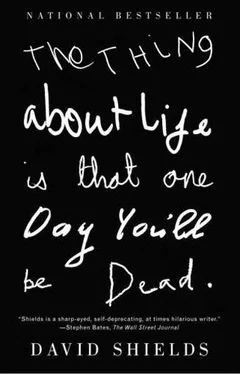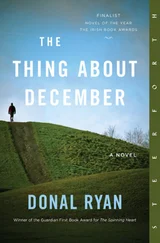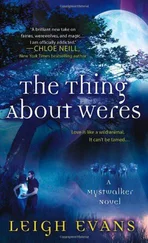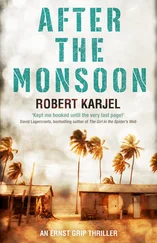James Boswell frequently attended public hangings in eighteenth-century London. Afterward, he liked to look at the faces of the dead bodies. Once, while the bodies were still dangling, he went directly to a prostitute. “I have got a shocking sight in my head,” he said he told her. “Take it out.”
Easier said than done, because, as Michel Houellebecq writes in Elementary Particles, “The chromosomal separation at the moment of meiosis which creates haploid gametes is in itself a source of structural instability. In other words, all species dependent on sexual reproduction are by definition mortal.”
In The Merchant and the Friar, the nineteenth-century poet and critic Sir Francis Palgrave wrote, “Coeval with the first pulsation, when the fibers quiver, and the organs quicken into vitality, is the germ of death. Before our members are fashioned is the narrow grave dug, in which they are to be entombed.”
Jules Bordet, a Belgian scientist, wrote, in a famous formulation 100 years ago, “Life is the maintenance of an equilibrium that is perpetually threatened.”
“Boys are like Pez dispensers,” says a teenage girl. “Show ’em a nipple and they get an erection.”
In The Tragic Sense of Life, Miguel de Unamuno wrote, “To live is to give oneself, perpetuate oneself, and to perpetuate oneself, to give oneself, is to die. Perhaps the supreme delight of procreation is nothing other than a foretasting or savoring of death, the spilling of one’s own vital essence. We unite with another, but it is to divide ourselves: that most intimate embrace is naught but a most intimate uprooting. In essence, the delight of sexual love, the genetic spasm, is a sensation of resurrection, of resuscitation in another, for only in others can we resuscitate and perpetuate ourselves.”
A male American college student says, “I picture Death as being millions of years old but only looking about forty.”
“Life,” Virginia Woolf wrote in her diary when she was 44, “is, as I’ve said since I was 10, awfully interesting—if anything, quicker, keener at 44 than 24, more desperate, I suppose, as the river shoots to Niagara—my new vision of death; active, positive, like all the rest, exciting; & of great importance—as an experience.”
Giacomo Leopardi wrote, “Death is not an evil, for it liberates from all evils, and if it deprives man of any good thing, it also takes away his desire for it. Old age is the supreme evil, for it deprives man of all pleasures, while leaving his appetite for them, and brings with it all sufferings. Nevertheless, men fear death and desire old age.”
Tom Stoppard: “Age is a high price to pay for maturity.”
Antony says to Cleopatra, “I am dying, Egypt, dying.”
According to Thomas Browne, the physician and author of Religio Medici, “The long habit of living indisposeth us to dying.”
When Confucius realized he was about to die, he wept.
All human beings have bodies. All bodies are mortal. Yours, too, is one of these bodies.
In World War II, my father was assigned to Army Information and Education; his job was to lecture to the troops about America’s allies and enemies and send news releases to the hometown newspapers of the men in the outfit. If a private was promoted to Private First Class, my father would send a press release to the private’s hometown paper announcing that he’d been promoted for his “courage under fire” and “military bearing.” But when the radio battalion headquarters in the middle of the compound on Okinawa announced, on August 8, 1945, that the Japanese had surrendered unconditionally and would be signing the peace treaty later that day aboard ship in Tokyo Bay, my father went berserk and raced down to the mess hall, where he told the mess sergeant, Coleman Peterson, that he was taking over and would be serving breakfast to the 120 men in the unit.
Sergeant Peterson told my father he’d lost his mind and would want to quit after the first six grunts went through the chow line complaining that the scrambled eggs were too hard and the pancakes were too thin. My dad told Peterson nobody, including Douglas MacArthur, was going to stop him.
Peterson insisted on at least preparing the egg and pancake mixes. My father agreed, tied an apron around his waist, and when the first man came through the line, asking what was on the menu this morning, my father sang out, “Horseshit on French toast. No, actually, the V-J Day special: scrambled eggs, bacon, all the pancakes you can eat, and the strongest coffee on the island!”
Apparently, though, my father is not immortal:
On my most recent visit, he evaluated, as he always does, what kind of physical shape I seemed to be in and contemplated, as he always did, the potential safety hazards of my one-handed driving. He asked me, as he always did, whether Natalie had enrolled in swimming lessons yet—he was concerned that she’d wander into Lake Washington and drown—and when we went to a department store so he could buy a birthday present for Natalie, he made sure, as he always did, that I paid for it. He apparently wants to take his not very vast fortune with him.
The next morning, when I arrived 15 minutes late to take him out to brunch, he was sobbing. Fearful that I’d perished in an auto accident, he’d called my hotel, 911, and even Laurie back in Seattle to see if she’d heard anything about my whereabouts. At the restaurant, he vehemently criticized the spiciness of the soup, which couldn’t have been more bland; he wanted nothing sharp to throw him off stride.
Having not seen my father for several months, I was startled by his swift decline: he shuffled around his tiny apartment, which was almost empty, because of his new fixation with getting rid of nearly everything he owned; his breathing was loud and labored; his eyes were glassy and flat; a pouch of skin sagged beneath his left eye; a portion of his left ear had been excised in surgery to remove skin cancer; he ping-ponged back and forth between diarrhea and constipation; he often neglected to zip his zipper.
Waiting for Sicko to start, he asked me when and where I learned the facts of life. The people in the row behind us convulsed into giggles, and though it seemed a little late to be discussing the birds ’n’ the bees, I had to answer quite loudly—his hearing aid wasn’t working well—that I consulted a variety of sources on the subject. Thanks to his malfunctioning hearing aid, he found the movie utterly unintelligible. Leaving the theater before the lights had come up, he took a bad tumble down the stairs, to the collective gasp of the audience.
“I’m perpetually tired,” he wrote me when I returned home. “Used to be—until a year ago—I could swim a dozen laps. Can just about make 3 to 4 now. I crave sleep a lot. With the aid of sleeping tablets—Tylenol PM—I sleep in two sessions, from 9:30 to 4:30, then breakfast, then back to bed for a couple of hours, plus an occasional nap of one-hour duration. I used to go to the 18-hole putting green at Woodlake often, now indifferent to its lure. Haven’t gone in a couple of months. On the positive side, I still work out in the gym for 30 minutes. Usually on the stationary bike. Do that after lunch. Like a forced march. But I still do it and am glad I’ve still got the willpower. To sum it up, some of my most vexing problems are traceable, I’m sure—and so are you and you’re correct—to the passages of the years. Ninety-seven ain’t 79.” For my father, this very partial and begrudging acknowledgment constitutes a major declension.
The Story Told One Last Time, from Beginning to End
As soon as your reproductive role has been accomplished, you’re disposable.
After sexual maturation, deterioration in peak efficiency occurs because, as Harold Morowitz, a professor of biology at George Mason University, says, “perfect order requires infinite work.” Also, deterioration builds on itself.
Читать дальше












